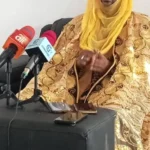Stakeholders, at a Moral Regeneration and Re-orientation meeting, organised by Universal Basic Education Commission (UBEC) in Abuja on Tuesday
By Funmilayo Adeyemi
Stakeholders, on Tuesday, converged on Abuja to brainstorm on ways of tackling the menace of moral decadence in children and to enhance development and progress of the country.
The stakeholders, at a Moral Regeneration and Re-orientation meeting, organised by Universal Basic Education Commission (UBEC) in Abuja on Tuesday, advocated relevant programmes in schools for effective moral education.
Prof. Soji Oni, of Department of Sociology, University of Lagos, stressed the need to find solutions to the falling standard of education, occasioned by absence of moral values.
According to him, moral regeneration must also be taught, not only in schools but at home, worship places, cultural gatherings and the likes, in order to bring back the moral qualities in the educational sector.
“There is the need for periodic evaluation of the education system so as to keep the system on track.
“Government, parents, teachers, political, religious and community leaders must provide moral leadership in order for children to learn.
“There is the need for appropriate action on what the children are watching on the internet.
“The Federal Ministry of Education, UBEC and SUBEB should draw programmes on relevant moral education that are different from social studies to provide conscious efforts at transmitting the values to our learners.
“This should mean that every school curriculum must contain values and morals that should be taught, as this will lead to reduction in incidences of corruption and other vices in our society,” he said.
Dr Hamid Bobboyi, Executive Secretary, UBEC, said before now, the commission had conducted an explorative survey to gather information on the level of moral degeneration, its causes and effects on teaching and learning in schools.
Bobboyi said with the re-orientation and regeneration of morals of learners at the basic education level, there would be appropriate character and value judgment that would make the society peaceful.
He further stated that there should be a place where children growing into adulthood would be made to behave appropriately.
“Over the years, there has been great concern over the degeneration of moral and overturn of values in our society.
“This is demonstrated in the many vices and negative behaviours, such as stealing, drunkenness, financial crimes, known as yahoo-yahoo, truancy, violence and many others.
“The disheartening aspect is that many of these vices are now prevalent in our schools, especially the basic education schools.
“The mantra: “education for all is the responsibility of all’ should be our guiding principle in whatever contributions that would be made here today.
“This will also go a long way in building a society where people innately demonstrate appropriate behaviours, obey laws, behave responsibly and have sense of patriotism,” he said.
Similarly, the Chairman, Independent Corrupt Practices and Other Related Offences Commission (ICPC), Prof. Bolaji Owasanoye, said moral education was key to reduction of corruption in the society.
Owasanoye, represented by Director, Public Enlightenment and Education, ICPC, Mr Mohammed Baba, said that the commission had introduced several moral regeneration programmes, in line with ICPC’s mandate of reducing corruption in the country.
He said that other moral regeneration programmes had been introduced in tertiary institutions, with emphasis on the national value curriculum developed in conjunction with Nigerian Educational Research and Development Council (NERDC).
The ICPC chairman added that the curriculum was infused into English Language, Mathematics, Civic Education and religious education from primary to tertiary levels.
He further stated that in a bid to transfer knowledge from the curriculum, the commission, in 2018, trained no fewer than 200 teachers on the implementation of the curriculum.
The News Agency of Nigeria (NAN) reports that the event brought together education stakeholders, including teachers, parents, religious leaders and other stakeholders drawn from EFCC, National Council for Women Society and NAPTIP. (NAN) (www.nannews.ng)
Edited by Auwalu Birnin Kudu and ‘Wale Sadeeq











